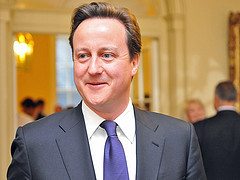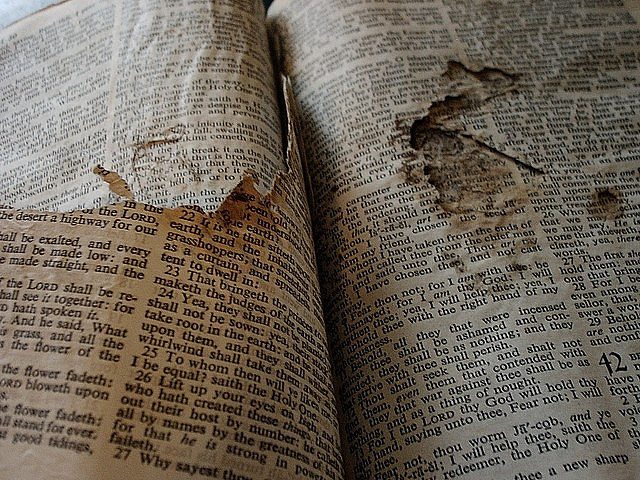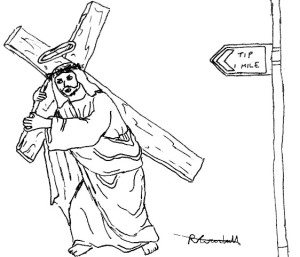Is Britain really a Christian country?
‘A handful of middle-class atheists who think that reading half a chapter of The Selfish Gene at university has turned them into zeitgeist-surfing cultural radicals.’ A witty label, coinedby (Christian) Giles Fraser in a recent Guardian piece decrying Eric Pickles’ use of Christianity as a form of ‘state triumphalism’, that must be appreciated even by those who are its intended bearers. Arguing the case of secularism in the UK is not only to attach oneself to a movement with an unfortunate reputation for complacency and arrogance, but also sometimes feels like pushing at an open door. No one is proposing that British schools teach the non-existent ‘controversy’ over evolution, and it is true that religion does not dominate public discourse in this country as it does in others.
 However, when the Prime Minister sees fit to reveal to us the ‘healing power’ of his own faith, and, writing in a religious publication, suggests that Britain as a ‘Christian country’ becomes more ‘evangelical’ about its (his) religion, that door’s hinges cry out for oiling. 65% of respondents to the 2011 census identified themselves as not being religious. ‘Christian’ is a label only applicable to Britain when reflecting on our history. And whilst it would be regrettable for anybody to lose sight of the unparalleled importance of Christianity in our heritage, faith has, regardless of whether one views this situation happily or not, never been less integral to our society.
However, when the Prime Minister sees fit to reveal to us the ‘healing power’ of his own faith, and, writing in a religious publication, suggests that Britain as a ‘Christian country’ becomes more ‘evangelical’ about its (his) religion, that door’s hinges cry out for oiling. 65% of respondents to the 2011 census identified themselves as not being religious. ‘Christian’ is a label only applicable to Britain when reflecting on our history. And whilst it would be regrettable for anybody to lose sight of the unparalleled importance of Christianity in our heritage, faith has, regardless of whether one views this situation happily or not, never been less integral to our society.
Aside from the worrying growth of faith schools and the laughable (if embarrassing) relic of the 26 Anglican bishops in the House of Lords, Britain basically is a secular country
David Cameron mentioned how he is frequently told by Jews or Muslims that it is easier for them to pursue their faith in Britain ‘than in a secular country’, and ascribes this somehow to the tolerance which Christianity apparently compels its adherents to display. One must congratulate him for acknowledging freedom of religion as a virtue, but it seems rather unfortunate that he has come to this opinion only in order to comply with a decree from the divine. In truth it is only secularism that can guarantee freedom of worship, because it treats all faiths equally. Aside from the worrying growth of faith schools and the laughable (if embarrassing) relic of the 26 Anglican bishops in the House of Lords, Britain basically is a secular country, and credit for the tolerance of all religions in a secular climate may not be stolen by David Cameron for the Church.
In this same article the Prime Minister welcomed ‘the efforts of all those who help to feed, clothe, and house the poorest in our society.’ Forgetting that his crushing austerity measures are the reason the poorest in our society increasingly need help to feed, clothe and house themselves, this remark was made apparently without a hint of irony. In future he would do well to be a little less Christian and a little more Christ-like.
[divider] flikr.com/felicityatkinson
[divider] flikr.com/number10


Comments (3)
Pls our church need to be reconstructed is almost falling down
Britain is first and foremost a Democratic country.
Britain has had an extremely successful Monarchy and Christian Religion which is indicative of their capability to diversify to meet what we know as a modern Democracy. The Monarchy, for example, remains a valuable asset to the British economy.
Christianity is wrongly tied to government, it is simply an NGO, and must hold status as an NGO. Britain has a lot to celebrate in the proportion of atheists – anything which you accept on ‘belief’, without any proof, is very scary.
Religion is itself just a tiny part of science and we see even today how it is used to make people do both wonderful and terrible things. We should celebrate our history, but we should do so in context.
Democracy values individuals; it educates them, protects them when out of work, supports their families and protects them during their life. Communism is idealistic, and would work perfectly if everyone was perfect. Religion was used to control people who had nothing to loose. All of these are components of science, and children should be taught this information to protect them from religion, particularly in the context of extremism.
NGO: N*ggers Granted Overlordship